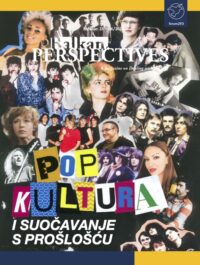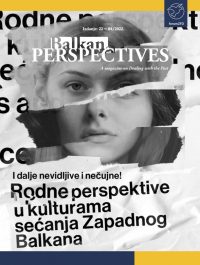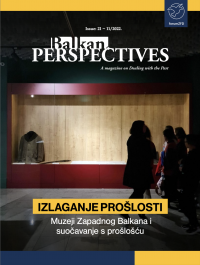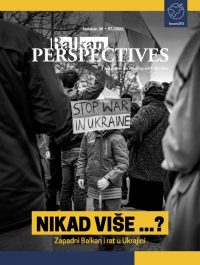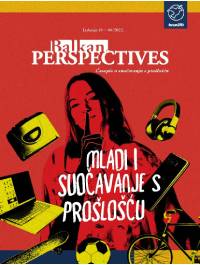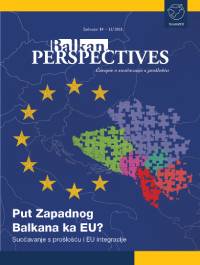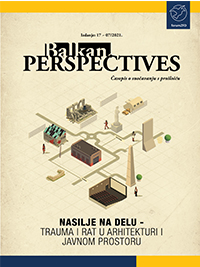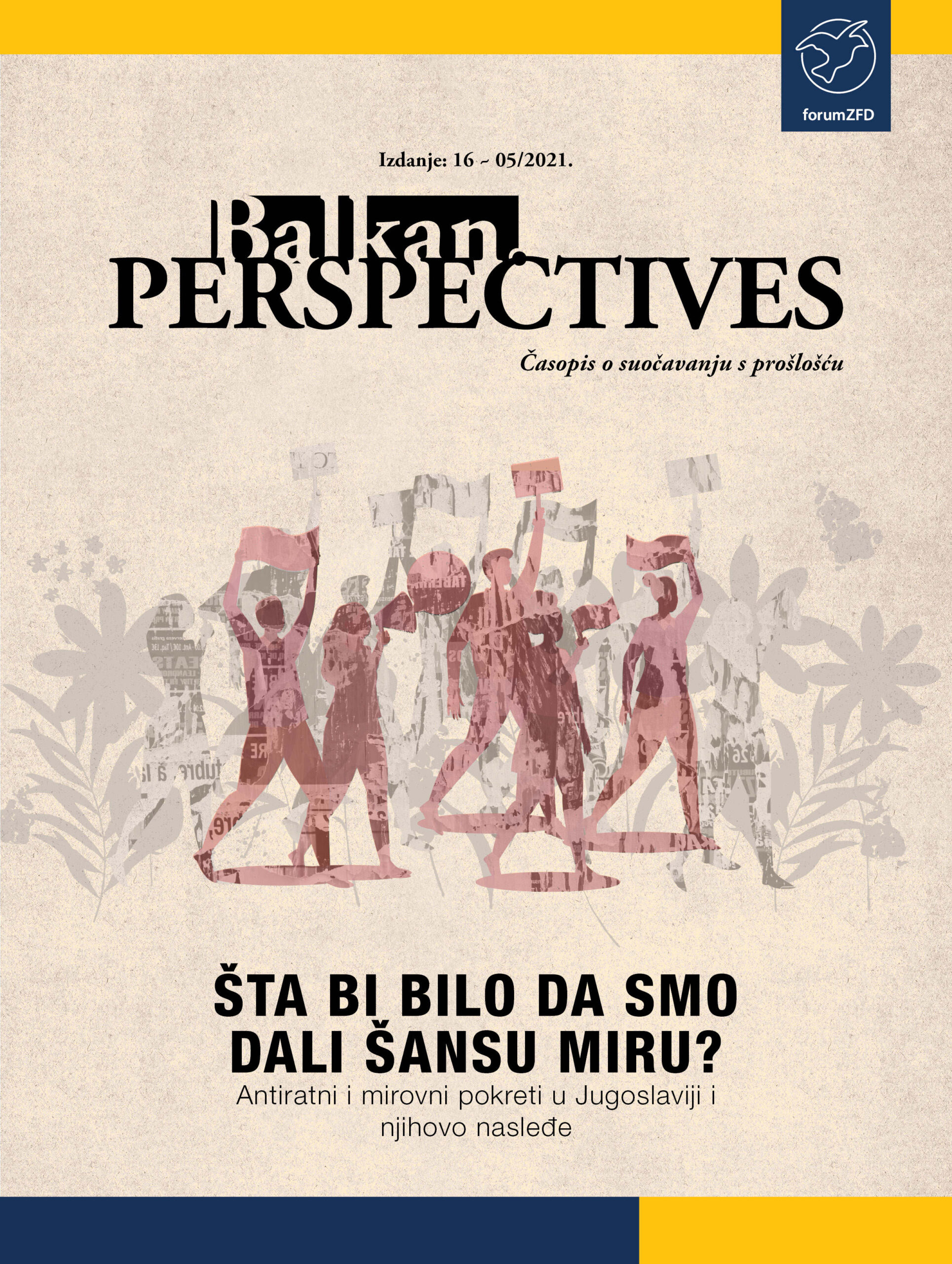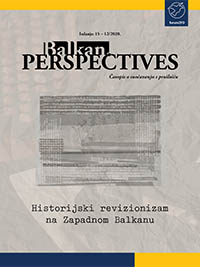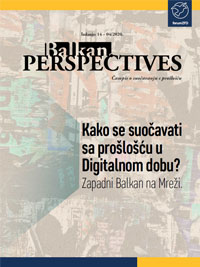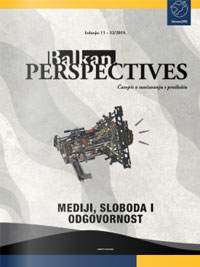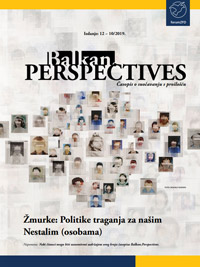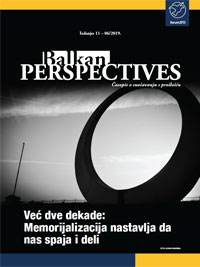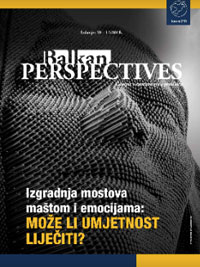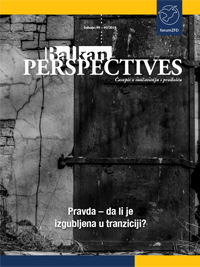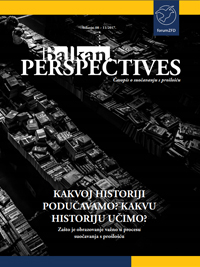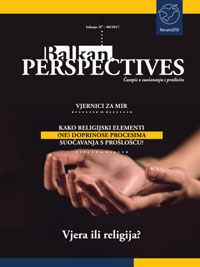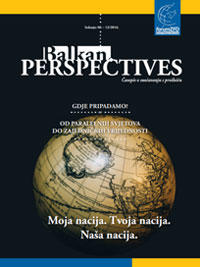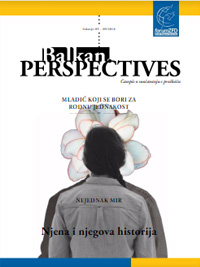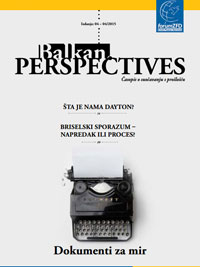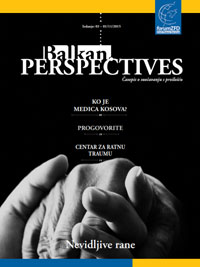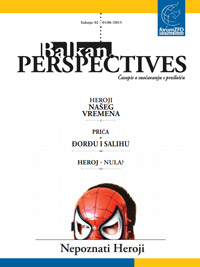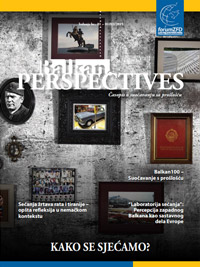Časopis Balkan Perspectives
Balkan.Perspectives je časopis koji se bavi suočavanjem sa prošlošću (DwP) na Zapadnom Balkanu. Izdaje ga forumZFD na četiri (4) jezika i on predstavlja saradnju između Bosne i Hercegovine, Kosova, Sjeverne Makedonije i Srbije. Ovaj časopis osigurava platformu za lokalne aktere u cilju podrške konfliktno osjetljivog diskursa o pitanjima vezanim za nedavnu prošlost. Nuđenjem različitih perspektiva o temama vezanim za suočavanje sa prošlošću iz cijele regije, ovaj časopis se nastoji boriti protiv stereotipa i etnocentričnih narativa, potaći na kritičko razmišljanje i širu debatu, te ojačati konstruktivne pristupe suočavanju sa prošlošću.
Možete se pretplatiti na časopis elektronskim putem tako što ćete poslati e-mail na adresu balkan.perspectives@forumzfd.de. Pozdravljamo i cijenimo vaša mišljenja i povratne informacije i nadamo se da ćete ovaj časopis smatrati vrijednim resursom.
Broj 22
03/2023
Još uvek nevidljive i nečujne! Rodne perspektive u kulturama sećanja
Prošlo je već sedam godina otkako je moja koleginica, a potom i glavna urednica, Maike Dafeld, napisala u svojoj uvodnoj reči za časopis Balkan.Perspectives izdanje 09/2016: “Kada je u pitanju suočavanje s prošlošću na Zapadnom Balkanu, poštovanje roda obično znači razgovarati samo i isključivo o seksualnom nasilju nad ženama tokom rata. Kao posledica toga, žene se ne vide kao agenti promena, a takođe nisu uključene kada pokušavaju da prevaziđu nasilnu prošlost i ponovo izgrade mirno društvo.”
Bilo je nekih promena i razvoja u proteklih sedam godina. Međutim, i dalje se suočavamo sa izazovima kada razgovaramo o ženama i njihovoj ulozi u suočavanju sa nasilnom prošlošću regiona.
Broj 21
11/2022
Izlaganje prošlosti – Muzeji Zapadnog Balkana i suočavanje s prošlošću
Dvadeset i prvo izdanje časopisa Balkan.Perspectives bavi se muzeološkim pejzažima na Kosovu, u Bosni i Hercegovini, Severnoj Makedoniji i Srbiji. Ovo izdanje razmatra kulture sećanja prema nasilnom raspadu Jugoslavije u ovim državama i njihovu zastupljenost u muzejima regiona. Tekstovi i podkasti istražuju muzeje kao mesta sećanja, memorijalizacije i suočavanja sa prošlošću. Međutim, muzeji su deo diskurzivnog stvaranja istorije i stoga predstavljaju mesta sećanja i stvaranja istorije. Muzeji nisu neutralni i ne odražavaju objektivnu stvarnost. Oni su takođe agenti unutar dinamičnog skupa procesa u kontekstu izgradnje nacije, sukobljenih istorija i odgovarajućih narativa. Stoga, ovo izdanje, sa autorima i gostima u podkastima, teži da doprinese kritičkim i raznovrsnim perspektivama i pristupima o ulozi i funkcijama muzeja u regionu, u kontekstu suočavanja s prošlošću.
Broj 20
07/2022
Nikad više…? Zapadni Balkan i rat u Ukrajini
Datum 24. februar 2022. označava trenutak velike promene u Evropi. Od kraja Drugog svetskog rata slogan „Nikad više!“ bio je simbol političkih, ekonomskih i kulturnih napora protiv ratova i nasilnih sukoba, nacionalističkih narativa, holokausta, genocida i teških kršenja ljudskih prava. On snažno naglašava evropski diverzitet, slavi inkluzivnost i sve nas smatra odgovornim da učimo iz iskustava prošlosti.
Broj 19
04/2022
Balkan.Perspectives #19 posvećen je mlađim generacijama na Zapadnom Balkanu; da ih motiviše i izazove u različitim oblastima vezanim za suočavanje sa prošlošću, izgradnju mira i proces pomirenja.
Broj 18
11/2021
Evropska unija je igrala i još uvek igra važnu ulogu u kontekstu tranzicione pravde i procesima suočavanja sa prošlošću nakon nasilnih sukoba u državama bivše Jugoslavije tokom 1990-ih i ranih 2000-ih.
Broj 17
07/2021
Novo izdanje Balkan.Perspectivesa namerava da ovim temama doda još jedno značenje. Balkan.Perspectives #17 “Nasilje na delu – Trauma i rat u arhitekturi i javnom prostoru” kritički je osvrt na to kako su trauma, rat i nasilje oblikovali naše neposredno okruženje, zgrade i mesta u kojima živimo, čineći stoga traumu delom naše svakodnevice, doprinoseći glorifikaciji nasilja i etnonacionalističkih diskursa.
Broj 16
05/2021
Godine 2021. obeležava se 30. godišnjica događaja koji su rezultirali nasilnim raspadom Jugoslavije. Priče o nasilju i ratu i dalje odjekuju regionom Zapadnog Balkana kroz etnocentrične politike, istorijski revizionizam, negiranje ratnih zločina, nacionalističke politike, kao i zanemarivanje važnosti suočavanja sa zajedničkom prošlošću.
Broj 15
12/2020
U prethodnim izdanjima redakcija se već bavila pitanjem kako i zašto se istorija u regionu Zapadnog Balkana osporava, dovodi u pitanje i instrumentalizuje. Prerađivanje, tj. (ponovno) pisanje istorije nije neutralno, već se pre radi o promišljenom političkom procesu koji teži da uspostavi stvarnosti i narative, i koji odražava odnose moći tokom različitih perioda.
Broj 14
04/2020
Suočavanje sa prošlošću je teško svarljiva tema, naročito na Zapadnom Balkanu, sklonom konfliktima. Pre nego što su onlajn platforme ovde dramatično stupile na scenu, svaka istina iz tih konflikata bila je podložna manipulacijama lidera i njihovih propagandnih mehanizama u cilju oživljavanja mita velikih nacija.
Broj 12
10/2019
On 30 August 2019, the Day of the Disappeared did not go unnoticed in the former Yugoslavia. Marches were organized to bring attention to the more than 10,000 people who are still missing from the recent wars here
Broj 11
06/2019
It’s been twenty years since the end of the wars in the western Balkans. Diverse, complex and rich in culture and history, the region has much to celebrate. When it comes to memorializing the recent militarized past, however, free space is limited.
Broj 10
11/2018
With great pleasure, we present our 10th issue of Balkan.Perspectives: Building Bridges with Imagination and Emotion: Can Art Heal? When the past is made up of conflicting accounts and interpretations, each not acknowledging the other…
Broj 9
03/2018
Welcome to the 9th edition of Balkan.Perspectives, forumZFD’s magazine on dealing with the past! This issue is dedicated to the topic of trials and justice related to the recent history of the Balkans.
Broj 8
11/2017
In recent days, we as a team have been discussing a theatre play featuring actors from across the Balkans. They were presenting their own memories and stories from their lives, all of which were very moving. But what left the greatest impression was the fact that all these stories became interlinking facets of one shared history which had had a huge impact on all their lives.
Broj 7
06/2017
While one should not describe the wars in the Western Balkans as solely religious conflicts, the role of religion shouldn’t be left out when talking about dealing with the past in the Western Balkans. Many peace building initiatives are linked to religious movements, and terms like reconciliation and forgiveness remind us of religious values that are promoted by most religious institutions.
Broj 6
12/2016
The Balkans is a region where borders throughout the history have changed multiple times. They were imposed by foreign powers, broken down, redrawn, displaced and disputed over the years. With a rise of the nation-state concept and against the backdrop of great instability in the region, nationalism has spread across the region throughout the last century with significant relevance today
Broj 5
09/2016
Welcome to the fifth issue of the Balkan.Perspectives, forumZFD’s magazine on dealing with the past. This current issue is dedicated to the topic of gender and numerous questions on why gender matter in the process of dealing with the past. When it comes to dealing with the past in the Western Balkans, respecting gender usually means discussing only and exclusively about sexual violence against women during war times.
Broj 4
04/2016
Dealing with the past is a broad subject; it encompasses many processes that a society can undergo when addressing violence and political oppression in its past. In previous issues we have explored abstract and emotional topics such as the remembrance of the past, the commemoration of known and unknown heroes and how survivors deal with trauma.
Broj 3
11/2015
Violence, conflict and war do eventually end. However, the events from the past still haunt those who experienced violent conflict. In our newest issue of Balkan.Perspectives we are therefore focusing on the psychological effects of war and conflict. We want to draw attention to those who are still affected by the past. How do people who have been traumatized cope with their experiences? What kind of support do they get from their societies and where have they been neglected?
Broj 2
06/2015
The prince on the white horse, the silent dark knight fighting evil, the strong and tall demigod from ancient myths – stories about heroes have always been told. They offer comfort and make us believe in the victory of good over evil. In times of conflict and war, these images are harder to keep apart. One’s hero will be the other’s strongest enemy. Who decides then who is the good guy and who the bad?
Broj 1
02/2015
Wars always represent an acute catastrophe for a society since they destroy the social order and confront the individual with violence and death. They also change the identity of all participants involved in the conflict. The post-war societies of the Western Balkans have established various narratives of the past that are mostly in conflict with one another and usually influenced by an ethnocentric point of view.
